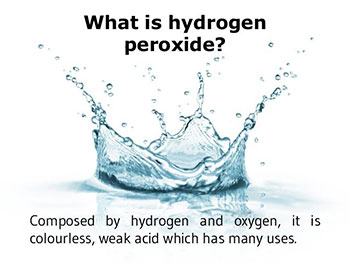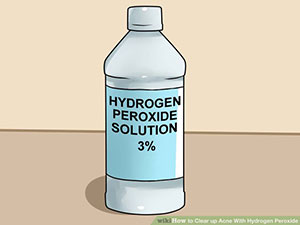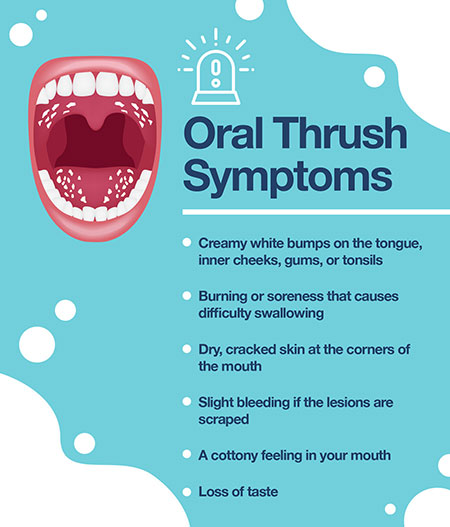Mississauga residents have many choices for oral rinses. Hydrogen peroxide rinse is a gentle antiseptic used to ease minor mouth tenderness (e.g., attributable to canker/cold sores, gum inflammation, dentures, and orthodontic appliances).
Hydrogen peroxide was developed in 1818 by French chemist Louis Jacques Thénard (1777–1857), and dental practices have used it for nearly 100 years. It’s safe for most as an oral rinse in low concentrations. It operates by discharging oxygen. Hydrogen peroxide is an “oxidizing” oral rinse (e.g., Peroxyl, 1.5%). It destroys anaerobic bacteria and has a mechanical cleansing action as it foams when it touches debris in the mouth. It is often used for short periods to treat “acute necrotizing ulcerative gingivitis.” However, side effects with prolonged use might occur, including the growth of the “lingual papillae.”

You can benefit from hydrogen peroxide if you don’t use it too often and the concentration is appropriate. Especially important- don’t swallow it!
You can find hydrogen peroxide in 1% and 3% solutions. As an oral rinse, the strength should be no more than 3%. Hydrogen peroxide has both antiviral and antibacterial properties. It also can be used as a household cleaning agent and treats minor burns and cuts. However, it can potentially burn the skin if used in inappropriate concentrations.
Hydrogen peroxide as an oral rinse can calm irritated throats. It can help you fight off bacterial attacks linked to sore throats. Also, when the saliva in your mouth comes into contact with hydrogen peroxide, it generates a froth. This foam makes the saliva less sticky and easier to drain. Dr. Hawryluk Jr. recommends a solution of 3% concentration (maximum) and weakening it with two parts of water for sore throats. It’s best not to swish hydrogen peroxide for over 30 seconds, and make sure not to consume any solutions.

Hydrogen Peroxide can also help treat gum disease due to its antiseptic properties. In addition, its use reduces the bacteria Porphyromonas gingivalis in the mouth – which causes gingivitis. Plaque accumulating on the teeth contains a slimy layer of bacteria called a “biofilm’. Hydrogen peroxide liberates oxygen that helps destroy the bacteria. One advantage of swishing with a hydrogen peroxide solution is reaching the rear of the oral cavity and spots that may be difficult to access with dental floss. Please talk to Dr. Hawryluk to see if hydrogen peroxide suits you.

Hydrogen peroxide can help remedy canker sores: When dabbing hydrogen peroxide on a cut or sore, it foams and discharges oxygen, which has a cleaning effect. By the exact mechanism, hydrogen peroxide can also help diminish the spread of COVID: Hydrogen peroxide inactivates corona and influenza viruses.

Hydrogen peroxide can treat oral thrush – fungal contamination of the mouth. It is not infectious and is usually favorably treated with antifungal medication. Another name is oral candidosis (or candidiasis) – caused by a group of yeasts called Candida. The antiseptic benefits can help you keep your mouth clean if you have oral thrush and relieve symptoms. If you contract a light thrush after taking medicines, consuming yogurt, or taking over-the-counter “acidophilus capsules”, a delicate toothbrush and washing your mouth with a diluted 3 percent hydrogen peroxide solution numerous times a day could help.

There are some risks and disadvantages of using hydrogen peroxide mouth rinse:
- It can be toxic when ingested: Swallowing too much can cause serious side effects, including burning the digestive tract, illness, and vomiting.
- It can cause a Black hairy tongue: This is a harmless and passing oral condition that appears a lot more detrimental than it is.
- You don’t want to use a high concentration of hydrogen peroxide because it can infiltrate the dentin’s enamel, dentin, and collagen-rich tissue, degrading it.
Please talk to our Mississauga dental office staff to see what oral rinse is best for you.
Dr. Hawryluk doesn’t recommend HP rinses as a whitening solution because “to obtain meaningful teeth whitening results with hydrogen peroxide-based mouth rinses, you would need high concentrations, which could harm your oral mucosa”. While dentists use hydrogen peroxide for teeth whitening, a home mouth rinse will not likely have a very noticeable effect on tooth color, as the percentage used by dentists is much higher (around 25%). In addition, it is not advisable to attempt to use a professional strength of hydrogen peroxide at home as you could seriously burn your gums or skin, permanently damage your teeth, or injure your internal organs.

We are a Mississauga dental office based in the Port Credit District. It would be our pleasure to serve you. Please drop by!
Reference (Covid-19: what treatments are being investigated? 02 July 2020, Andrews S Ayettey, The BMJ)
https://www.medicalnewstoday.com/articles/324121#uses-and-benefits
- St. Lawrence Dentistry Looks Forward To St. Patrick’s Day! - March 12, 2025
- Understanding Dental X-Rays and Radiation: What You Should Know - January 13, 2025
- Happy New Year from St. Lawrence Dentistry! - December 30, 2024










